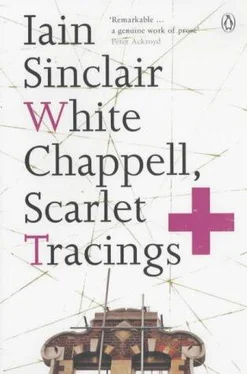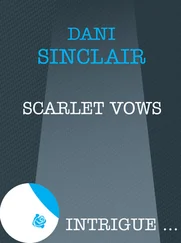Nothing. The exhausted sun falls, bending the shadow of the obelisk away from the house, and the book pirates, as they squat, foxes, in their bush; casting them into a ditch of darkness.
‘Do you have an edition, Sir, of a book by Arthur Conan Doyle? A Study in Scarlet .’
Leper-Klamm manifests. The door has not opened, their eyes never left it, but Klamm is at their side, hand in front of his face; cuff flapping, black tie loosed, shirt buttons open, revealing a severely-foxed undergarment.
‘I think we could share the expense, Sir, on this occasion, of a taxi. Yes. Yes, Sir. Thank you.’
And immediately, as Leper-Klamm raised an arm, a cab, bowling down the bus line to carve up a cyclist before she hit the Old Street roundabout, slapped its brakes and squealed obsequiously to a halt.
We headed east, womb comforts, Nicholas Lane giving himself a well-deserved nose jolt. The narrator closed his eyes, to shut out the plague of street names, the undiminishing stream of high buildings, cornice, frieze, architrave, gaunt façade. He could swallow no more detail.
J. Leper-Klamm, very softly, began to sing.
To: Sarah Hinton
Bartholomew Close, London
May, 1850
My dear Sarah,
Once again I take up my pen to defend my actions: to you who understand them best. I confess, with feelings of the deepest mortification, that I hold myself to be a fool, blinder than any 3 beetles. I am ready now to throw down my pen in sheer disgust at my incapacity. It takes me weeks and months to find out the plainest, simplest things. It is only in the last two days that I have opened my eyes to the most obvious deduction — namely, that we have a power of controlling our thoughts; if the brain thinks, it must be something else that controls this action. There is something in us, or connected with us, that makes use of our brain: something thinks us, that’s evident. Something dictates my dictation. My brain, I am now certain, is a part, and only a part, of some greater intelligence — and my only purpose must be to let that intelligence, that mind, use me. I must serve my own will; for my will is more than my own.
I am a fool, as I said before. I have been diving into the abstrusest of physiology, and mounting into the higher abstractions of morals, to find evidence of this fact; shutting my eyes to it all the while. I deserve a good whipping for my stupidity. I could wish there was someone here to give me one now.
It is clear that if the brain is the organ that thinks, there certainly exists something that makes use of it for thinking. The brain is the organ of the spirit, the instrument by which the spirit carries out its purposes, whether of thinking or acting. The brain is perfectly passive, just as passive as a piano. I hurl down the false dogma — viz., that living matter can act of itself. That is a grand error. Living matter, like dead, can only act as it is acted upon.
It is Physiology that must clear up these metaphysical disputes; in fact, metaphysics must be merged in physiology, as astrology in astronomy.
Don’t you remember that Coleridge terms the understanding ‘a sensuous faculty’ and exclaims, ‘If there be a spiritual in man, the will is that spiritual’?
It wasn’t reason that led Coleridge to say that. It was inspiration. It was one of those bursts of intuition by which great poets in all ages have anticipated the discoveries of science.
I come, in the end, to this — the spirit is will and the will is holy; I must not inhibit, or stand against, its promptings. The will is law: the law is, have no law. Hold to nothing, be ready for anything. Love is the law: love and do what you will: what wills you is love.
This is a horrid letter; you mustn’t puzzle your brain about it. I have sent the letter to you only because I could not send it to Margaret. The endeavour to understand oneself should bring us into closer intimacy with our Maker. I cannot strive to penetrate the depths of my being, without feeling, afresh and more deeply, the intimate relation in which I stand to God and His care for me, His love of me, the happiness it must be to do His Will.
It is agony for me to dwell upon the idea that I have gained Margaret’s love only to make it a source of misery to her. I cannot vindicate myself. I wish that I had some punishment to bear that might relieve me from that thought. I have told Margaret that perhaps it is my first and chief duty at present to seek for truth; and that nothing can so well supply the kind of knowledge most useful, most requisite for me, as the seeing of mankind under all their various phases, the watching of human nature and human passions as developed under various circumstances.
I should be afraid to have any woman for my wife who would deliberately sacrifice what she considered her duty to God for love to me.
I must go to bed; but I want you to have this letter in the morning,
your brother,
James
Hinton, the surgeon, sat at his kitchen table, dissecting a mutton chop and carving a human ear. He ran his blade along the spine of the helix, peeling back tissue. He looked at the surface of the cartilage and saw the face of a man, in profile, something old but unborn. The secret listener to all our sorrows. A copy of Coleridge’s essays on The Principles of Method was propped open before him. He forked up a sliver of cold meat, composing a letter to Caroline Haddon, his intended sister-in-law. For ten years his understanding with her sister, Margaret, had simmered, steamed, faltered, prosed, analysed itself; but now that he had an income, patients, a house of his own, the marriage could be postponed no longer.
The saviour of women. Whenever he thought of Margaret he wrote to Caroline. Margaret was to be his partner, the mother of his children, but Caroline would remain something more, the woman who listened to him, who had time, unattached, to follow him in his speculations.
He wanted Caroline for a sister much more than he wanted Margaret for a wife. A wife would be a part of himself, would qualify his idea of himself, but a younger sister — that was a darker mystery.
The dissection of the chop was complete, Hinton cleaned his fingers in his beard, cleaned the beard on the lapel of his jacket; bare-necked, long nosed. The wild undisciplined eyes turning inwards, forcing the world beyond his reach into focus. No time to take up his pen; Hinton dictates to the white cell of his kitchen. To the window, the narrow close, the tree-shaded graveyard of St Bartholomew the Great, the courts of the Hospital, now swollen far beyond the priory church that gave it sponsorship; Rahere’s malarial vision, the great black eagle taking him to the lip of the bottomless pit.
Flayed saint, Hinton would inscribe his testament upon the skin of your back: nail it to the door. Alleyways of false windows, painted watchers. Hinton, his mouth a spider, dictates a web of beard.
Caroline. I am justified. I am without envy, the Saviour of Women. Love is the law: do what you will. I never yet laid my hand upon any portion of God’s universe that did not turn to gold beneath my grasp. Caroline. Open the shrine, that I may see my saint.
Dr Gull told me that many years ago he was walking through a field of peas. He took a few in his hand, and as he meditated he rolled them between his fingers. While thus engaged he passed by a house where lived a woman deranged in her mind. She asked him to give her what he had in his hand. He gave her two peas; she took them. The next day he called and found that they had cured her.
And what did he do then? He laughed. He might have saved from pollution the paper on which have been printed cruel books. He did not do it; but be his faults forgiven him — we have all sinned.
Читать дальше












